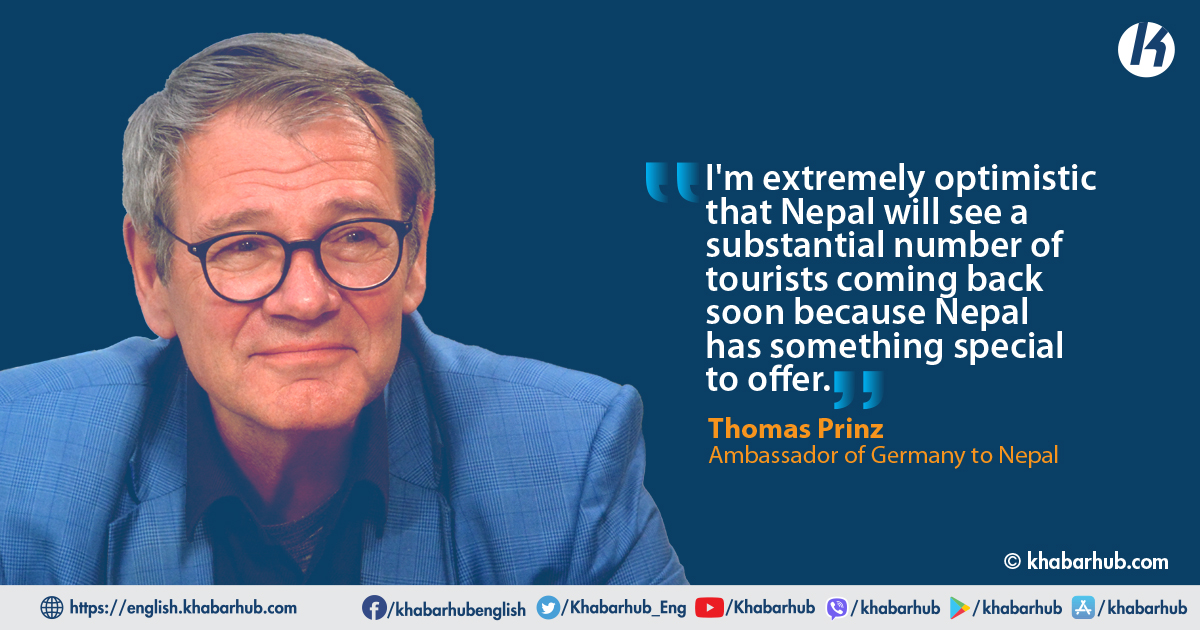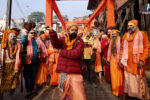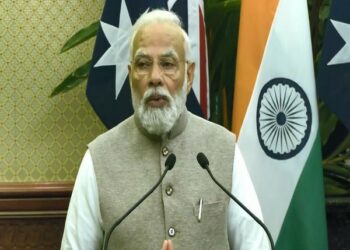Thomas Prinz, the Ambassador of Germany to Nepal, assures that his country and the European Union stay committed to Nepal’s development and well-being of Nepali people. Germany has brought in about 4.1 million doses of vaccines to Nepal recently. Ambassador Thomas assures that Germany would continue its support to Nepal.
The two countries established diplomatic relations in 1962, and the bilateral relations between Nepal and Germany have been marked by cordiality, friendship, and cooperation.
Ambassador Thomas has also served as the Director-General at the German Institute of Taipei since 2018, and German Ambassador to Bangladesh from April 2015 to 2018.
He graduated from the University of Heidelberg, and completed his Ph.D. from South Asia Institute, and has also attended the University of Giessen.
In an interview with Khabarhub, he said that since the two countries have a long history of good and friendly relations, they can still add bricks in the future. Excerpts:
How is Nepal treating you?
(Laughs) Nepal is very nice and treating me very well. But currently, Covid has affected our normal lives. Now we do not get delegations coming in. We do not have travelers and visitors. Everyone is suffering from economic constraints. I very much hope we all will overcome this situation soon.
But I have to say we all have suffered a little bit from the Covid crisis. You know, now we do not get delegations coming in, we do not have travelers going out, we suffer from economic constraints and so on and I hope to overcome this situation soon.
You mentioned about Covid pandemic. Could you tell us something about German support to Nepal as part of the COVID-19 pandemic response?
Germany has supported Nepal as many other countries to Nepal. We are the second largest contributor to the Covax alliance, and we have brought in about 4.1 million doses of vaccines to Nepal recently. We are continuing our support to Nepal, and in early March I expect delivery of surgical face masks. And, of course, we will also continue to monitor the situation as to how it’s going on, how the Omicron variant is going to affect Nepal and we will respond accordingly.
How do you see the response of the international community in the recent spread of the second wave of COVID-19 pandemic in Nepal?
Well, it’s difficult to say right away or to analyze the overall situation. I think the developed countries could have done a little bit more in an early stage to help those countries in urgent need of vaccines. But at the moment I think that we all acted a little bit according to the development of the virus. So nobody knows for sure how Omicron is affecting us. It seems that Omicron is not as steady as the Delta variety. And so we have to adjust our strategies practically from week to week.

What are the post-COVID future prospects of Nepal-German cooperation and relations? How can both countries develop a long-term partnership?
In fact, we have had a long-term partnership since the establishment of our diplomatic relations in 1962. The beginning of our development cooperation was in 1966. We have a long history of good and friendly relations and I hope that we will, after Covid, can come back to normalcy. Since we already have a long history of good relations, we can still build on that. Moreover, I also expect some German tourists to come back to Nepal. And I hope that our trade relations will come back to what they have been to before COVID 19. So I’m quite optimistic that after COVID-19 we will see good development of bilateral relations.
This includes the tourism sector as well.
Yeah, definitely! We get emails every week from people asking us whether they can visit Nepal. They often ask us when the borders will open. Germans, including the politicians, want to visit Nepal. So basically, I’m extremely optimistic that Nepal will see a substantial number of tourists coming back soon because Nepal has something special to offer. No other country in the world has to offer the experience like in Nepal. You have a wonderful nature, cultures, ethnicity, among others make Nepal wonderful and unique.
As an ambassador, what plans do you have to work in Nepal to further strengthen the ties?
Oh well, I have tried to support all those who are active here from the German side. We have numerous supporting NGOs here in Nepal taking their own initiatives — privately funded organizations, from the medical sector to the educational sector. I would try to support them. And, of course, my efforts will also be to continue with our official development cooperation at a time when Nepal is graduating from a least developed country to a middle-income country. We want to support that process. There are some changes connected with, for instance, market access for the EU, among other issues.
How do you analyze the recent political developments here in Nepal? Moreover, we are having local-level elections on May 13. What is your observation?
In fact, I do not want to interfere in Nepal’s internal matters. But as a whole, I can see positive developments in Nepalese society and politics.
When you look back over the decades you have continued to grow. People’s consciousness has grown, especially when it comes to the sake of democracy, human rights, participation, inclusiveness, and so on. And we can see those positive changes in many ways and in many aspects. So I think Nepal is on the right track.
You mentioned the role of civil society, NGOs, and the private sector. What areas can the civil society or the NGOs work in post-Covid?
There are still quite a number of areas, including education or health care where Nepal needs some support. In fact, it is equally important that we help Nepal to make the 2015 Constitution function properly, which means that the local bodies have to function properly. And this is also a part of our development cooperation with Nepal.
In the education and skill-based sectors, do you see any opportunities for cooperation between the two countries?
Definitely, firstly, we offer university placements for Nepali students in Germany. We have about 500 students going to Germany each year, and they get a full scholarship. Universities in Germany are free. International students only need to pay for their personal cost of living. The students need to have very little knowledge of the German language for their convenience. So this is what we are continuing to offer for Nepali students. We also offer training opportunities. We have a training program for vocational and technical training here in Nepal.
Is it that the Nepali students going to Germany for higher studies need to have a basic knowledge of the German language?
Well at the university, they follow an English-speaking program. But somehow they have to survive because not every German speaks English. Knowing a basic knowledge of the German language is for the convenience of an individual.
Are there any plans to send Nepali youths to Germany as migrant workers?
In fact, we do not have any plans as such. There is no government plan for immigration. But in the long term, Europe needs immigrants because our workforce is shrinking. So in the long term, there might be some chances of sending Nepalis as workers to Germany. But at the moment I do not see any possibilities for workforce immigration to Germany.
As an Ambassador, what message do you want to convey to the Nepalese youth?
Learning and studying. That’s it. That is what I would not only say here in Nepal that is what I’ve taught my children at home and what I tell everybody. Since we’re growing together on a global market, it is the learning and the knowledge that help. You have to keep on learning.
Could you share some of your experiences in Nepal?
I arrived here in September last year. Since then, I have been traveling a lot because we didn’t have many guests and delegations. So I had time to travel. I’ve been around the Kathmandu Valley, Upper Mustang, and I take short trips with my mountain bike around Kathmandu. I’m also jumping over the chain of mountains, looking around. It’s, in fact, a great experience. Nepal is a unique landscape, wonderful and the road up there is also a big adventure.
Can we say you are having quite a good impression of Nepal.
Definitely. I have to say I always wanted to come to Nepal. II already was in touch with my predecessor and we exchanged some experience, and convinced me to come to Nepal. It’s been a wonderful experience to be here.









Comment